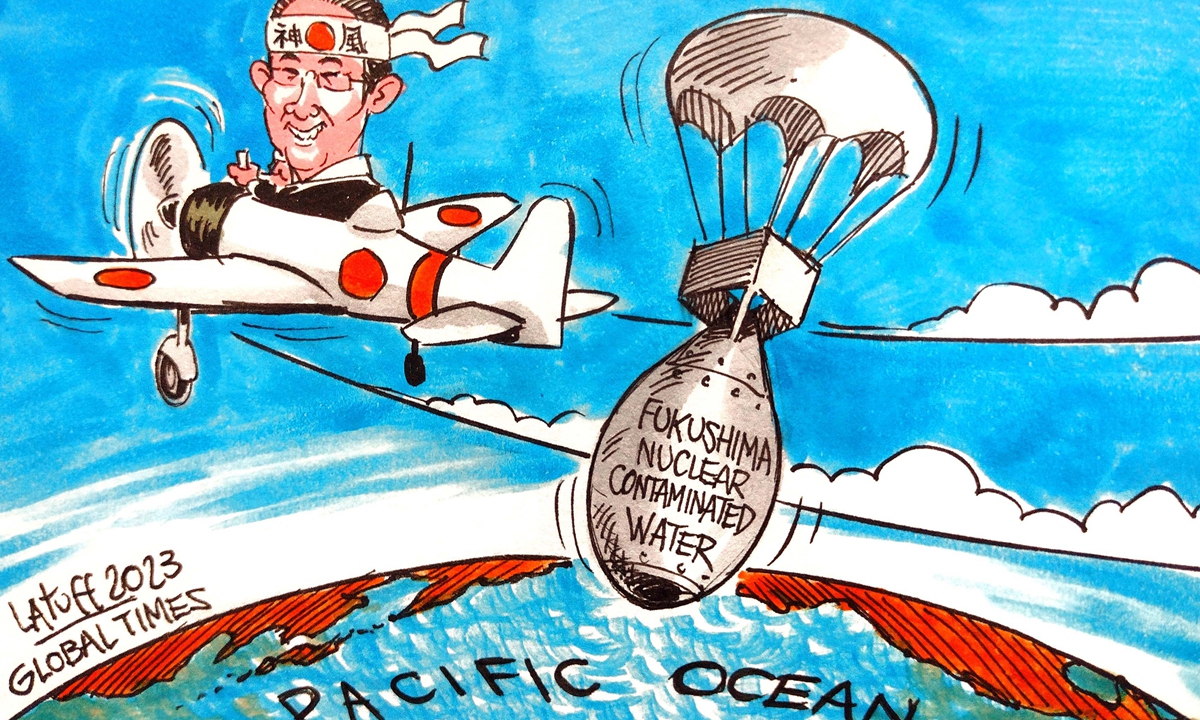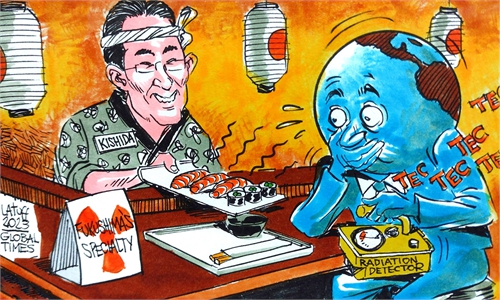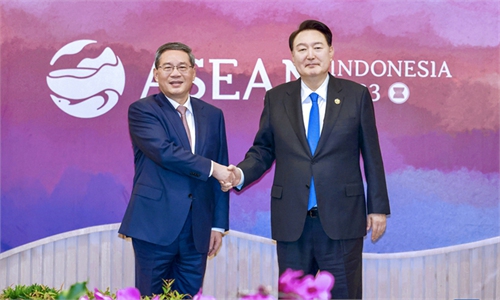'We want to stop contaminated water discharge ASAP,' says Japanese plaintiff group as Japan ends 1st phase of dumping
'We want to stop discharging ASAP,' says Japanese plaintiff group

Japan drops the "bomb" of nuclear-contaminated water into the Pacific. Cartoon:Carlos Latuff
With the first phase of dumping nuclear-contaminated wastewater from Fukushima scheduled to end on Monday and the second phase possibly set to start as early as late September, Japan's prime minister tried very hard to whitewash the dumping issue and shift the blame to China by lobbying by hook or by crook during the two-day summit of Group of 20 (G20) leaders, which wrapped up on Sunday.
Announcing the end of the first phase, which will release 7,800 tons of contaminated water, will come on Monday, TEPCO - operator of the Fukushima Daiichi nuclear power plant - gave no date for the start of the second discharge, Japanese media reported on Saturday.
About 1.34 million tons of radioactive wastewater is stored in about 1,000 tanks at the plant, according to the AP.
Plant workers will rinse the pipeline and other equipment and inspect the system over the next few weeks before starting the release of the second round of 7,800 tons stored in 10 other tanks, TEPCO spokesperson Teruaki Kobashi told reporters Monday.
This first phase of dumping coincided with the G20 summit held on Saturday and Sunday. Out of geopolitical considerations, some senior politicians of countries that will not be directly affected by the dumping and were coerced and wooed by Tokyo and Washington unfortunately gave Japan's disposal the nod after talking with Japanese Prime Minister Fumio Kishida, observers said.
On Friday, 151 people, counting residents from five Japanese prefectures including Fukushima and Tokyo, filed a suit at Fukushima's court against the Japanese government and TEPCO requesting they stop the dumping, Japanese media outlet Tokyo Shimbun reported.
According to the plaintiff's lawyers, this is the first lawsuit in the country to seek an injunction to stop the discharge. Additional lawsuits are scheduled to be filed at the end of October, Chiyo Oda, representative of the plaintiff group, told the Global Times.
Deliberately dumping contaminated water is a "double harm" by the Japanese government and TEPCO, which has a responsibility in the Fukushima nuclear accident 12 years ago that can't be shirked, the plaintiff group said, noting that the dumping violates the fishing rights and personal rights of fishermen and the "right to live peacefully" of local residents.
The plaintiff group pointed out that the dumping violates the London Protocol 1996, which prohibits the dumping of radioactive materials into the ocean.
"We hope the trial can stop it [the dumping] as soon as possible," Oda said.
Additionally, another Fukushima resident Yoshitaka Ikarashi, the Japanese representative of the Somei Platform - a Japan-China common market promotion association, told the Global Times on Sunday that he recently had meetings with several Japanese parties and are planning to establish a new cross-party group aimed at stopping the dumping.
Challenged by the domestic opposition, the two houses of the Japanese Parliament on Saturday held a joint review meeting on the issue of nuclear contaminated water discharge. The heads of the Japanese national fisheries' association who attended the meeting called on the Japanese government to assume its responsibility and respond to the unease and anxiety of the fishing industry.
The dumping also has affected Japan's tourism industry. In Fukushima city, the capital of Fukushima Prefecture, about 100 reservations for local hotels were canceled from late August to early September, according to Fukushisma local media.
Despite the strong concern at home, Kishida made every effort to flatter the G20 leaders who gathered in New Delhi, according to an official with Japan's foreign ministry as cited by Reuters.
"Prime Minister Kishida explained that the monitoring data collected since last month's (water) discharge began has been made public in a prompt and highly transparent manner…" Hikariko Ono, press secretary at Japan's foreign ministry, told reporters.
Meanwhile, Kishida criticized some countries are taking "uncommon actions" such as suspending all imports of Japanese marine products in response to the release of the contaminated water, Japanese media Yomiuri Shimbun has reported.
Kyodo News has reported that Dutch Prime Minister Mark Rutte fully "supports" Japan's approach, and Australian Prime Minister Anthony Albanese has also affirmed that Japan is cooperating with the International Atomic Energy Agency to take appropriate measures.
Chinese observers say that the PR stunts by the Japanese government are an admission of guilt. If the wastewater were safe, Tokyo wouldn't need to conduct such a big PR campaign.
Observers have condemned some heads of countries who have succumbed to the US-led clique's pressure and indulged the Japanese contaminated water dumping plan for risking their people's health and the world's future.
A Philippine nuclear expert who requested anonymity told the Global Times that similar to other countries, the dumping of contaminated water from Fukushima into the Pacific Ocean has also raised concerns and questions from various stakeholders in the Philippines. However, the reaction has mostly been mild, the expert revealed.




